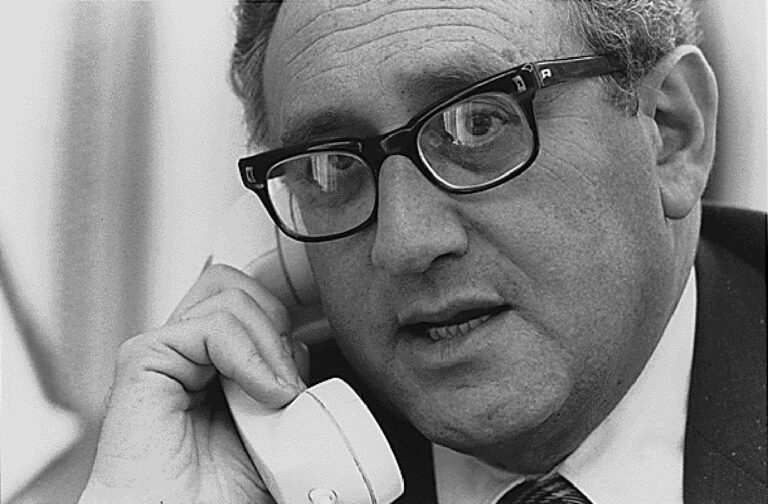
Henry Kissinger, the first Jewish U.S. secretary of state and a pivotal figure in American foreign policy, passed away on Wednesday at the age of 100.
Kissinger’s tenure as secretary of state earned him acclaim among politicians. However, his complex relationship with Judaism and perceived indifference toward Israel led to a mixed reception within the Jewish community.
Known for his Realpolitik approach, Kissinger was celebrated for his diplomatic acumen but criticized for turning a blind eye to war crimes committed by American allies.
Here’s what we know about his complicated relationship with Judaism and the complex legacy he leaves behind.
The basics
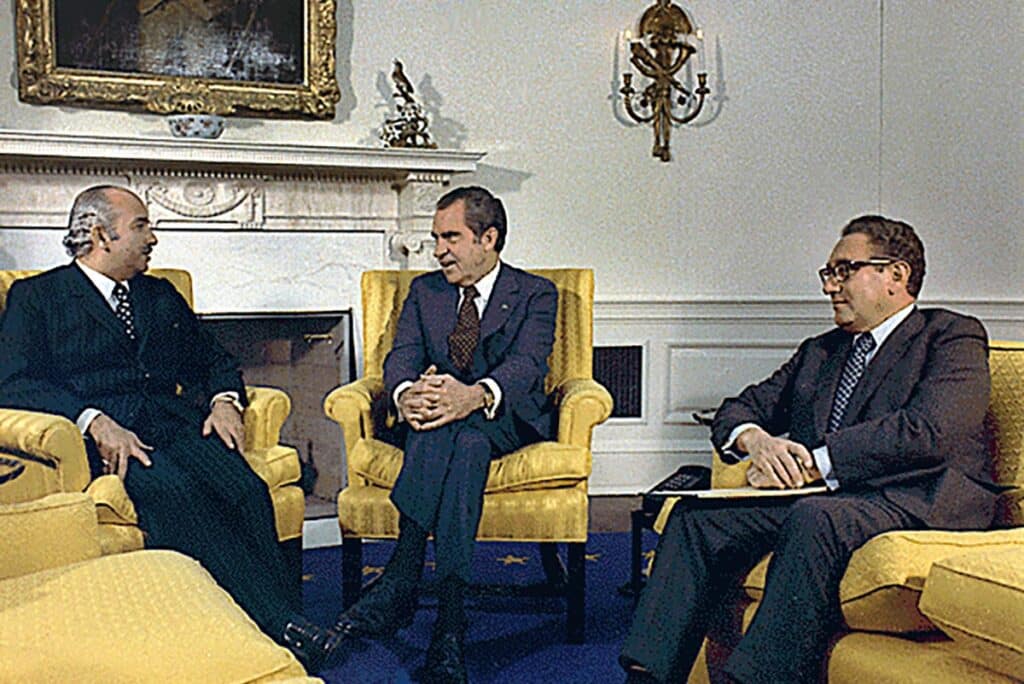
Kissinger was born on May 27, 1923, in Fürth, Germany, to Jewish parents, Paula and Louis Kissinger.
Hitler came to power when Kissinger was 9 years old, and the diplomat and politician later recalled how watching Nazism take over Eastern Europe profoundly impacted his life. He recalled being harassed and abused by his classmates in Germany due to his Jewish identity.
While he and his immediate family were fortunate to escape, several of his family members perished in the Holocaust.
After escaping Nazi Germany, Kissinger and his family settled in Washington Heights, New York City, in 1938. Like many immigrants at the time, he worked in a factory during the day and attended school at night, striving to achieve the American dream.
Read more: The forgotten history of Jewish Harlem
In 1943, 19-year-old Kissinger’s studies were interrupted when he was drafted into the U.S. Army. One of his peers noticed Kissinger’s fluency in German, which earned him a role in military intelligence.
This early military success was followed by several other accomplishments during his service during World War II, including being appointed head of administration of the city of Krefeld. Kissinger later recalled that his contribution to the victory over the Nazis “made me feel like an American.”
Notably, he earned his bachelor’s, master’s, and doctorate of philosophy from Harvard, paving the way for his long tenure in American politics.
Kissinger’s key accomplishments
He served as secretary of state and national security advisor under President Richard Nixon and secretary of state under President Gerald Ford.
Among his key accomplishments, Kissinger is praised for his role in easing Cold War tensions through détente with major Communist powers, notably China and the Soviet Union.
His most significant diplomatic maneuver was establishing open relations between the U.S. and China, paving the way for President Nixon’s historic 1972 visit.
With respect to the Middle East, Kissinger’s diplomatic efforts following the Yom Kippur War were critical yet also controversial (read more about this below).
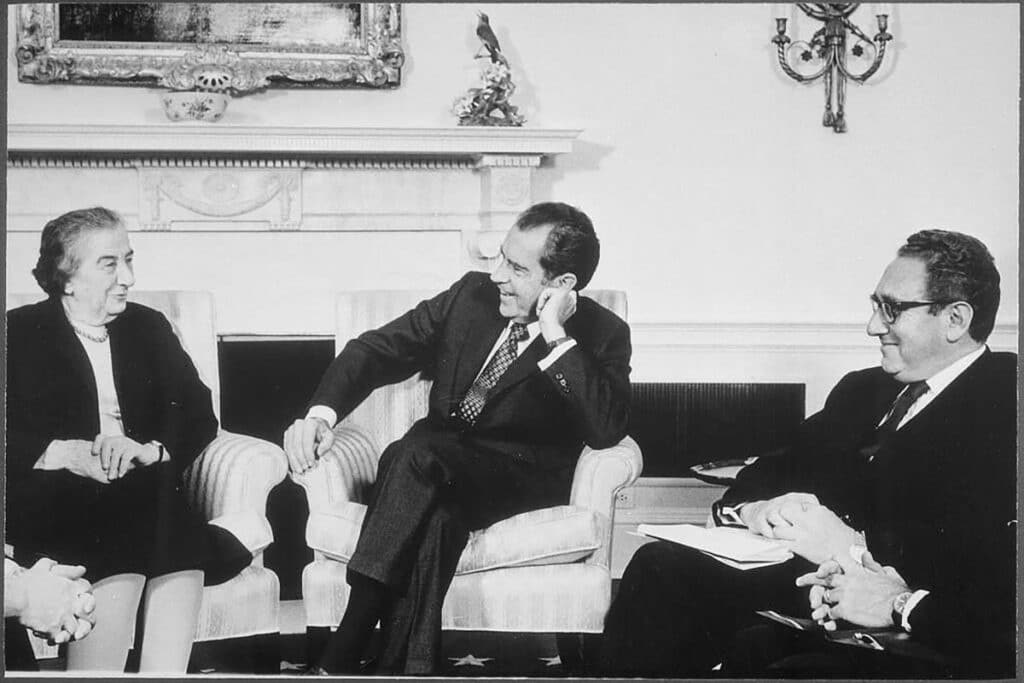
He was instrumental in negotiating ceasefires and disengagement agreements between Israel, Egypt, and Syria, which helped de-escalate immediate tensions and laid the foundation for future peace negotiations, including the Camp David Accords.
Kissinger’s role in negotiating the end of the conflict in Vietnam is another prominent aspect of his foreign policy legacy.
He played a key role in the peace talks that led to the Paris Peace Accords in 1973, which ended U.S. military involvement in Vietnam. For this effort, he was awarded the Nobel Peace Prize, an honor that remains controversial due to the ongoing conflict in Vietnam and the subsequent fall of Saigon in 1975.
Kissinger broke barriers as the first Jewish secretary of state
When Kissinger entered the foreign policy arena, there were still not that many Jews with prominent roles in American politics. In 1973, he became the first Jewish secretary of state.
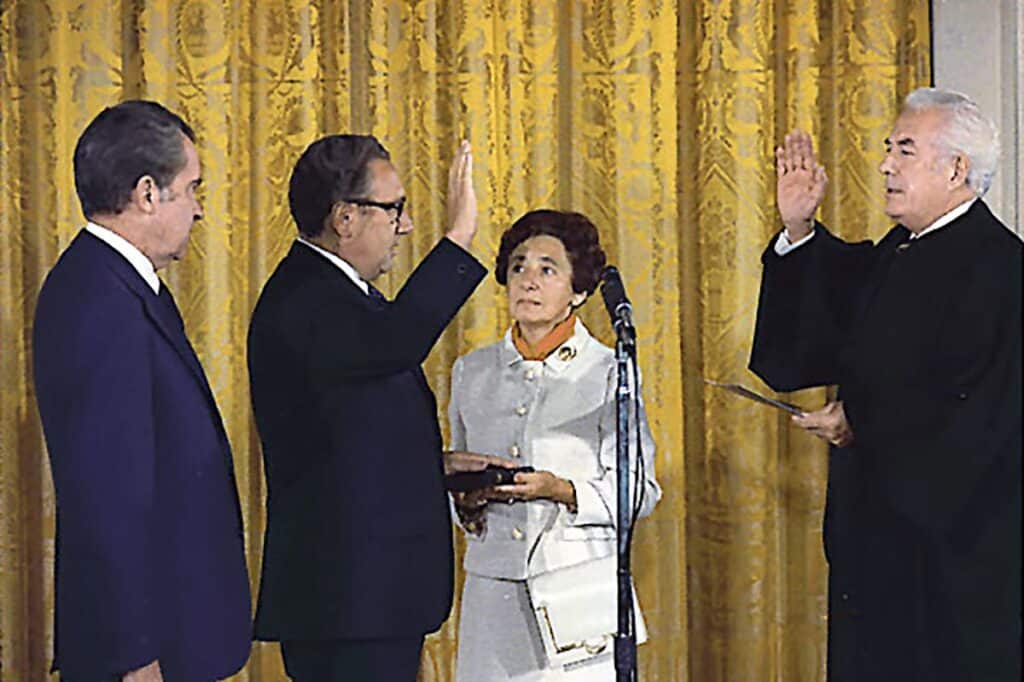
Kissinger faced antisemitism as secretary of state, with President Nixon derogatorily referring to him as “Jew boy” and “K*ke,” and accusing him of having “dual loyalty” to Israel.
His relationship with his Jewish identity was complex and strained, perhaps because of his background fleeing Nazi Germany and perhaps due to Nixon’s overt antisemitism.
Nixon, under whom Kissinger served, harbored strong antisemitic views, asserting that Jews should not be involved in foreign policy decisions concerning Israel.
He specifically instructed his staff to exclude Kissinger from any such discussions. While Nixon considered Kissinger and a few other Jewish officials to be exceptions, he was convinced that, “generally speaking, you can’t trust those bastards.”
Kissinger’s role in the Yom Kippur War and the Middle East is a subject of debate
When the Yom Kippur War broke out in 1973, Kissinger was serving as secretary of state under Nixon. He became a key figure in the U.S. response to the conflict, and his involvement remains a subject of debate.
To learn more about the Yom Kippur War, listen to our 3-part “Unpacking Israeli History” series.
Initially, Kissinger advised against Israel launching a preemptive strike on Egypt and Syria, instead advocating for the use of diplomatic channels. This approach was driven by a broader U.S. strategy to avoid escalating tensions with the Soviet Union, an ally of Egypt and Syria.
During the war, Kissinger was instrumental in orchestrating the U.S.’s response. He was involved in the controversial decision to delay military support to Israel — a move that significantly impacted the early stages of the conflict and put Israel at a strategic disadvantage.
However, when Israel’s situation became dire, Kissinger changed his stance and actively facilitated crucial assistance. When the U.S. began its military resupply to Israel, it significantly improved Israel’s position in the war.
As the war progressed, Kissinger played a pivotal role in seeking an end to the conflict. He engaged in “shuttle diplomacy” between Israel, Egypt and Syria, negotiating ceasefires and disengagement agreements. His persistent diplomatic efforts ultimately led to the war’s end.
His efforts were instrumental in de-escalating the conflict and setting the stage for future peace talks in the Middle East.
Historian Gil Troy noted, “There’s no way you could tell the story of Camp David and the Egyptian-Israeli peace treaty without mentioning Kissinger and the 1973 shuttle diplomacy.”
Kissinger distanced himself from his Jewish identity
Despite his personal experience fleeing the Nazis, Kissinger displayed little to no attachment to his Jewish identity, and even expressed disdain toward it, once telling a friend that Judaism “has no significance for me.”
In a conversation with then-Israeli Prime Minister Golda Meir, the secretary of state famously remarked, “First I am an American, second I am Secretary of State, and third I am a Jew.”
“The negation of Kissinger’s Jewish identification may have been necessary for a man who rose higher in the executive branch than any Jew before him, and did so under a president, Richard Nixon, known to harbor deep anti-Jewish animus,” the JTA wrote.
“Others saw it as emblematic of Kissinger’s Machiavellian streak and embrace of realpolitik, the hard-nosed approach to diplomacy that eschews moral concerns in favor of raw assessments of national interests.”
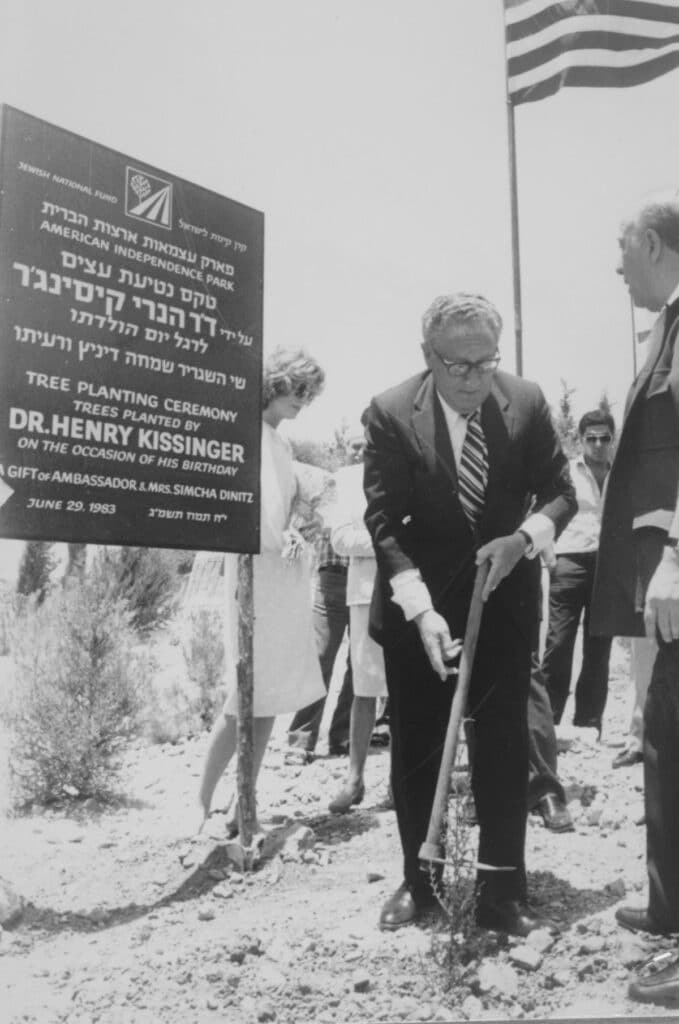
Kissinger’s attitude toward his Judaism often shaped his policy decisions. For instance, he deemed the plight of Soviet Jews a matter not deserving of American intervention, saying coldly:
“The emigration of Jews from the Soviet Union is not an objective of American foreign policy. And if they put Jews into gas chambers in the Soviet Union, it is not an American concern. Maybe a humanitarian concern.”
This stance is particularly striking given his own experience fleeing antisemitism in Nazi Germany.
He also opposed the idea of a Holocaust Memorial Museum next to the National Mall in Washington D.C., saying it would create “too high a profile” for American Jews and “reignite antisemitism.”
The origin of Kissinger’s negative views toward his heritage is unclear, but they certainly did not endear him to the Jewish community.
Kissinger’s complex legacy, while marked by strategic acumen and significant diplomatic achievements, continues to be viewed through diverse perspectives. His legacy will continue to be debated in the Jewish world and beyond.
Originally Published Dec 1, 2023 12:28PM EST
